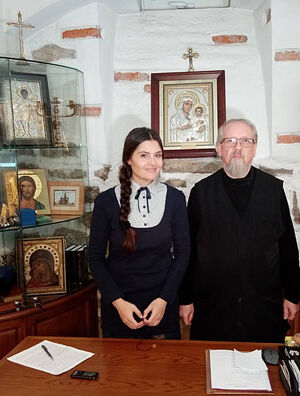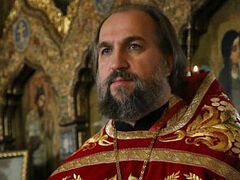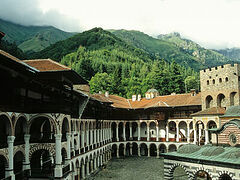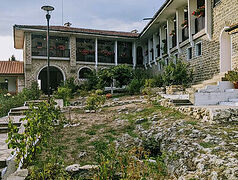The Russian Church of St. Nicholas the Wonderworker in Sofia was founded on September 2/15, 1902 at the Embassy of the Russian Empire, and since November 1952 it has had the status of a representation church of the ROC.
On September 21, 2023, the Bulgarian authorities ordered the priest of the church, Archimandrite Vassian (Zmeev), and the secretary of the representation, Archpriest Yevgeny Pavelchuk, to leave the country within twenty-four hours under the pretext that their stay in Bulgaria “poses a threat to state security.”
The church remained closed for over a month. By the decision of the Holy Synod of October 11, Archpriest Vladimir Tyshchuk, son of the famous Moscow Archpriest Arkady Tyshchuk, a cleric of the Diocese of Vienna and Austria, who had been rector of St. Nicholas Cathedral in Vienna since 2002, was appointed rector of the Russian church in Sofia.
The famous Bulgarian Orthodox political analyst and religious scholar Vasilianna Merheb talked with the new rector of the representation church for BSTV about his path to the priesthood; his experience of many years of service abroad, and about his opinion of the situation surrounding St. Nicholas Church.
The path to the priesthood
 Archpriest Vladimir Tyshchuk and Vasilyanna Merheb —Father Vladimir, you are a famous Russian priest’s son and you had the opportunity to serve in church from an early age. How did it influence your decision to become a priest?
Archpriest Vladimir Tyshchuk and Vasilyanna Merheb —Father Vladimir, you are a famous Russian priest’s son and you had the opportunity to serve in church from an early age. How did it influence your decision to become a priest?
—I was born in the city of Vladimir on the eve of the feast of Prince Vladimir Equal-to-the-Apostles, and so it would have been impossible to give me any name other than Vladimir. My father and grandfather were priests in those difficult Soviet years, when the Church was persecuted. Of course, this had a strong influence on me.
First of all, we were taught atheism. We couldn’t say in public that we were sons of a priest. Each of us tried not to talk about this so as not to be ridiculed and mocked. At the same time, life in a persecuted Church really leaves an imprint on your whole life, because you remember the times when in church you could hardly raise your hand to make the sign of the cross and could hardly lower it—there were so many people around that you couldn’t move. This is all part of my childhood memories.
As for the decision to become a priest, I noticed that every child goes through several stages of faith. At first it is childlike, sincere faith, which doesn’t demand any proof. Then there comes a time when questions appear in your soul, to which you seek answers in faith; and if you do not find them, you give up your faith. Not in the sense that you say, “I no longer believe in anything”, but in the sense that faith ceases to be relevant to you. Then everything depends on how your life develops. If you search and think about how to find answers to these questions, it may lead you to the priesthood.
I am often asked why my son is not a priest and why I did not insist on it. Well, it’s because the decision to become a priest must be voluntary. It’s not a profession—it’s a type of ministry you are chosen for by God, whether you recognize it or not. In my case, it was a miracle, because I was close to the Church, worked in the Church, and helped at the altar, but I could have worked as a translator or a driver; I never imagined that I would be ordained. At some point I was advised to consider the priesthood, and I did not refuse. And when I was told that His Holiness the Patriarch could ordain me, I realized that it would be a blessing from God.
—Your father was the first clergyman appointed by the ROC as rector of the Russian representation church in Sofia, where we are now talking. What are your memories of childhood in Bulgaria?
—If I were told a year ago that I would one day serve in Bulgaria, I would not have believed it, and would have laughed. But indeed, now you and I are sitting in the very church where my father used to serve. I came here, I think, in the fourth grade of school. This is the age when you begin to love learning, and look at the world around you.
I came from the Soviet Union. I don’t think I need to describe the country I lived in and what circumstances there were, but at the time moving to Bulgaria seemed fabulous to me, because it was a warm country with a beautiful sea, absolutely wonderful people; and the choir of this beautiful church made a special impression on my childhood consciousness. The way the choir sang was imprinted on my memory forever. I remember some moments in the sanctuary (I helped my father at that time, although I was still a young boy); I remember meeting people who visited him. And It’s impossible to spoil these childhood impressions, when you like something. Even if the reality changes later, your childhood impression prevails, leaving a warm feeling in the heart.
—Your life has gone on with the patronage of St. Nicholas the Wonderworker: You were ordained at St. Nicholas Cathedral in New York, then served at St. Nicholas Church in Austria, and now you are back in the church in honor of St. Nicholas. What do you think about this?
—Yes, it seems that my whole life has been under the blessing of St. Nicholas, and of course, I don’t regard it as a coincidence. Non-religious people believe in coincidences. True, experience of life abroad is special. In general, living abroad allows you to look at your own life and the lives of your compatriots from another perspective. You learn to take what is good from other nations and feel the shortcomings of your own country as well as foreign countries. It’s very interesting experience.
Service abroad
—Tell us about your ministry in Vienna, where you undertook a wide range of activities: hospitals, prisons, schools, kindergartens…
—I’m happy to share it with you, but it wasn’t my merit; circumstances turned in such a way that I had to do it. Let me explain. At some point during my ministry in Vienna, when there appeared many young people, emigrants and their children, people began to notice each other more and help one another. The Austrian Government passed a wonderful law allowing individuals to open kindergartens themselves. The State paid for the teachers, and parents paid for the rent of the premises. And so, one of our parishioners opened three Orthodox kindergartens next to the church. About forty of our children went to these kindergartens, including priests’ children. They attended the church regularly and took Communion once a week. As they grew up they knew our church, and, of course, it was very rewarding.
Prisons are another matter. There are all different kinds of immigrants. Russian-speaking people, but not necessarily ethnic Russians, also end up in Austrian prisons. Among the prisoners I met, Russians were actually a tiny minority. There were mostly people of other nationalities who spoke Russian.
Getting into straitened circumstances, a person naturally seeks help. When it was suggested that I go to the prisons, it was unexpected and unusual for me. It took me a whole year to get used to going inside a closed room where people were staying… It’s not to say that their conditions were bad—Austria has very good prisons, but nevertheless the prisoners deprived of certain freedoms. And when you meet with them—it leaves a mark. I always felt joy when I left the prisons—it’s an unforgettable feeling. A year later I felt just as happy when I entered a prison, because I knew that people were waiting for my help, and that I could help them in some way, at least by listening to them.
I am often asked: “Do inmates really seek a priests’ spiritual care?” It’s not always the case. Why? Because it seems that a true believer and member of the Church is much less likely to end up in prison than a non-religious person. And people who go to jail take their first steps towards faith through you. They realize that they have done something wrong, and their lives have gone according to a different scenario—not the one they planned. Your task is to explain to them patiently that they made a mistake, but there is the Lord Who is ready to forgive them and give them another chance. We help them with other things as well.
I remember there was one Russian-speaking prisoner who was released (he wasn’t from Austria, but from another European country). Another priest and I met him near the prison and realized that if we did not give him money at least for a ticket to get home, he would have to rob someone just to survive, and he would go back to jail. Of course, when you manage to help people like this, your heart is filled with special joy.
I have a wonderful icon of the Mother of God in my office in Vienna. It may not be as precious as it is here, but it is very dear to me. A monk sent it to me from Georgia. I met him when he was in prison. That was the first time he confessed and received Communion. His name was Vladimir, like mine. Now he is Monk Gabriel. He was released and started his life anew.
I always tell my assistants that our task is not to help as many people in prisons as possible. Our task is to keep people out of prisons. This is one of the aspects of the Church’s mission in the modern world.
—What is the attitude of the Orthodox Church towards such new Western “values” as sex change, same-sex “marriage”, abortion, etc.?
—Most people of my generation believe that the freedom that came to us (Russia) in the 1990s along with Hollywood movies, and the removal of taboos from previously forbidden topics, brought a lot of harm. There is probably some truth in this, because the West is very often at the forefront of societal developments, and we (Russia) are usually behind. Over a decade ago I read that the US Congress allocated a fairly large amount to promote a chaste lifestyle in families, and I thought that at that moment, while the countries of the former Soviet Union were breathless with joy, wallowing in the flow of information that had previously been prohibited, people who used to be at the forefront of this information realized its harm and reversed It is very important to be able to reverse the trends of this age and not just adopt them; to understand that not everything new is good.
It seems to me that the problem you are talking about is exaggerated. The percentage of people we’re talking about is very small. Whenever there is talk about disasters in a country, about the high crime rate or some terribly cruel people, I ask people living in this country if they know such individuals. When they say that they don’t, I understand that these are products of the media and information pressure. Sometimes we look at the world through the lens that the internet, TV and the media give us.
But I can say that the Church has always had the same view of this issue. The body is a far less significant part of the human being than the soul. Unfortunately, sometimes society places emphasis on the wrong points and doesn’t focus on what we should actually be looking at.
I read somewhere in the American press about how one man set up a table on his property, brought coffee and just started waving at passing cars. People in the cars started waving back at him. Americans are very friendly and hospitable people. A local newspaper wrote about this. There were more and more cars. He was sitting there waving, and everyone was waving back at him. But some neighbors complained that their peace had been disturbed. They sued this man, but he won the case because he had the right to sit on his property and wave at anyone. Eventually the case reached the Supreme Court. He won again. I won’t tell you the whole story, but as a result land prices fell in the area, and his son bought a house for a very low price there. In the end the whole focus was on that man, albeit the goal was absolutely different.
So, I wish all of us to discern the purpose of the propaganda against us in this world. Then we can develop certain tactics and save ourselves, our families, and our children.
—Over your more than thirty years of life in the West you have probably observed reactions related to the actions of Patriarch Bartholomew of Constantinople. What can you say about his actions towards the ROC and the UOC-MP?
—Any priest or bishop is called to always preach love. This love is not abstract, but very concrete and forms your attitude towards your loved ones, people in the parish and others—to everybody you meet. And any actions that violate this love and lead to division are felt very painfully. Especially when as a result people suffer, churches are taken away from the Church…
Russians, Ukrainians, Greeks, Poles, Hungarians, Americans, and Austrians go to our church in Vienna, and we feel fine together. And no matter what powers the devil may apply, even if they are reactionary religious forces, true love cannot be defeated.
It is very sad when your brethren take a position that leads to the destruction of unity. This painful to everyone. But when I was a student, I read the acts of one Council (I don’t remember which one), which condemned some heresy, and I was surprised by the wording: It said that the people who had provoked the division had inflicted a huge wound on the Church; at the same time, the Council called these people brothers and said that it was very painful for the Church to see them dying spiritually; so if these people understood their errors and turned away from their false ideas, it would be a great joy. This attitude—the ability to turn to such people—is very important. Because we must remember the goals that Christ set for us, despite all the turbulence of this world.
The history of the Church has already seen all this. There were famous schismatics who unfortunately went down in Church history forever; but apart from wounds and pain they achieved nothing.
—There are a huge number of Ukrainian refugees all over the world now. Many of them came from the Uniate church, many were not baptized according to the Orthodox rite or do not confess the Orthodox faith altogether... How do you think clergy should deal with this situation?
—There are plenty of refugees from Ukraine in Austria as well. More than that, I daresay that at St. Nicholas Cathedral in Vienna there are probably as many Ukrainians as Russians, if not more. They are marvelous people who have ardent faith, who are suffering for and worrying about their motherland. We help them as much as we can.
But I should also note that national division is not the only reason for difficulties. A diaspora is a community that is inevitably divided into some groups that, unfortunately, tend to come into conflict with one another. Even here in Bulgaria I must be open to everyone—to any group. Please don’t think that if I’m talking to a representative of one group today, then I’m against another group. Never!
I believe my task is to make sure that these groups do not exist, so that we are all as one before God—because there are no nationalities, no ages, and no professions in His sight. Before God we will either be justified or condemned, and it is vital to walk the path toward justification.
To be continued…



